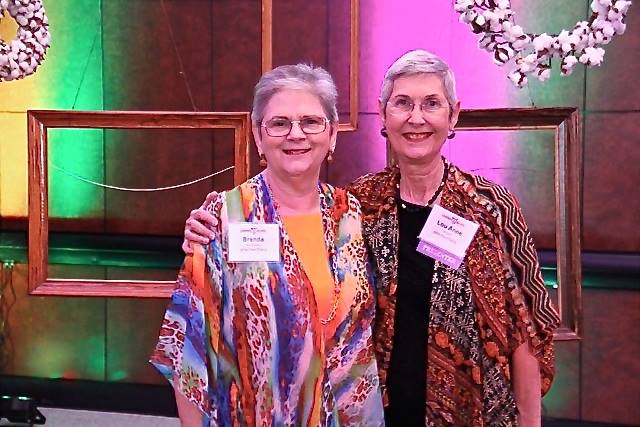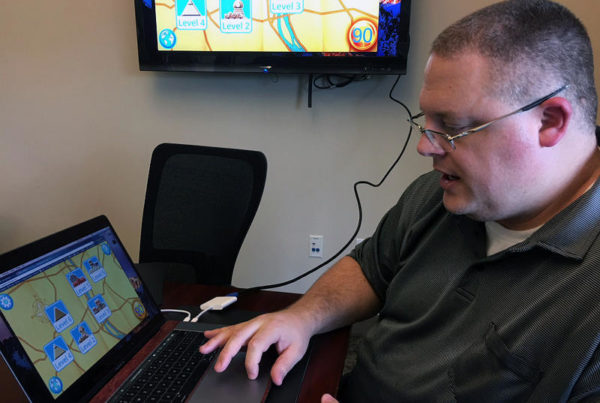Keeping a secret can be hard, especially within some corners of small-town Texas. Lou Anne Smoot of Tyler, Texas kept a secret for most of her life. But she’s now the author of a book sharing her story. The memoir, “Out: A Courageous Woman’s Journey,” is about Smoot’s experience coming out as gay as a 60-year-old Southern Baptist, and what that meant for her faith and family.
Smoot grew up with parents who valued religion, who “were leaders in their church. Seemed like we were there every time the doors open. And I learned to take my religion very seriously.”
She decided to attend Baylor University because it was Baptist. But something unexpected happened when she arrived in the fall of 1956.
“I had a roommate. And we fell in love with each other,” she says. “And this was a real shocker to me. Having been brought up in a very, very conservative home, I had never heard the words ‘gay,’ ‘lesbian,’ ‘homosexual.’ I had no idea it was even possible for a girl to fall in love with another girl. So, I had no vocabulary to explain to myself what was going on.”
Though the feelings were new, she says she knew it was love. “Oh, it was just such an overwhelming feeling. And I had never been in love before, but I just felt I couldn’t live life without her.”
Smoot and her roommate didn’t tell anyone, she says. “We had enough sense to realize that this was something you didn’t talk about. And I think we knew that because we had never heard anybody talk about it.”
But soon, her father figured it out. When Smoot and her roommate were apart for the first time over the Christmas holidays, they wrote letters to each other constantly.
Her father “caught on and rightly concluded that his only daughter was gay. And that’s when he told Mother and sent her in to have a talk with me.
“Well, of course, she shared with me what she had been taught, which was, it was sinful, and it was certainly an unacceptable way for me to live my life. Now, she and Dad had plans for me to earn my teaching certificate. And she told me that evening that no school district would ever hire me to teach in their schools. And then she explained that we would have a very difficult time just finding a place to live, that no one would rent us an apartment, and she said practically no one would even sell you a house. So, she painted a very bleak picture of our future together.”
Smoot says her mother was “exactly right” about how gay people were treated at the time, and are in some cases still today. But she didn’t break up with her roommate.
“We continued to carry on an affair at Baylor for about two-and-a-half years, and then when we eventually separated, then that was the end of it,” Smoot says.
Shortly after that, Smoot says, “I went ahead and followed my parents’ advice and eventually got married. Stayed married for 37 years. And was faithful to my husband during all of that time.”
Meanwhile, she continued corresponding with her old roommate, until the ‘70s.
“At that time I was very despondent with my marriage. And I wrote something to her that I should not have written. I made a comment that at least I was thankful that I knew what love was all about,” Smoot says. “And I knew she read those letters to her husband, I knew that. And after I mailed it, I thought, how is she going to explain what I wrote? And when she didn’t answer, I decided, that’s the way it needs to be. I never did write her again, and she never did write me again. And that was the end of our staying in contact with each other.”
Smoot says she hid her sexuality from her husband for several reasons, including the fear that she could lose her children.
“I didn’t want him to know, of course. I knew if he ever found out that I was gay, that in the courts of that day and time, and in many courts still today, it’s the gay parent who is declared the unfit parent, and custody of the children is awarded to the straight parent. I didn’t tell anybody. I didn’t read anything about the subject. Because I was scared to death somebody might figure out I was gay. And then I avoided having a close friend, because of that fear I just might fall in love with her. So, I became like a shell of a person.”
Then, in August of 1999, Smoot suddenly realized that she needed to make a change.
“At that time I was 60 years of age. I was teaching a ladies’ Sunday school class in the First Baptist Church, and one day I was simply visiting with one of those members,” Smoot says. “And she began telling me about her son, who was an artist. And this thought came into my head, Her son is gay… I believe God put that thought in my head, and I believe pushed me into what I did next, which was ask this woman, ‘Is your son a homosexual?’ Well, you don’t go around asking people that question. Especially in Texas and a member of a Southern Baptist Church. Well, she was shocked. And she hesitated for a long time. And then she finally said, ‘Yes, but that’s just the way God made him. And God loves him just the way he is, and we should too.’”
Five months later, Smoot finally asked her husband for a divorce. Even then, she only told him that she was unhappy in the marriage. But when she saw that he was blaming himself, “I reminded myself, we’d been married for 37 years. And I thought, you know, I owe him the truth. He took me in his arms and held me close and began sobbing. And I held him and cried.”
Smoot had a difficult time telling others in her community, and says she went into a depression for months, “But there was just that need to tell.”
She continued going to church throughout this time. After she came out, she says some people she considered friends would no longer look her in the eye.
“But then, I feel that God nudged me at that time. If I stayed, I told myself that I had a very unique opportunity to become known as a gay Christian – what to many, and maybe most and all the members of that church, was an oxymoron. So I decided to stay and then when my present wife, Brenda – and we have now been together over 17 years – when she joined me at the church, then together we became the church’s example of a gay Christian couple. And we made a point of sitting about the third row from the front in the center section, where everybody could see us.”
Written by Rachel Taube.
















